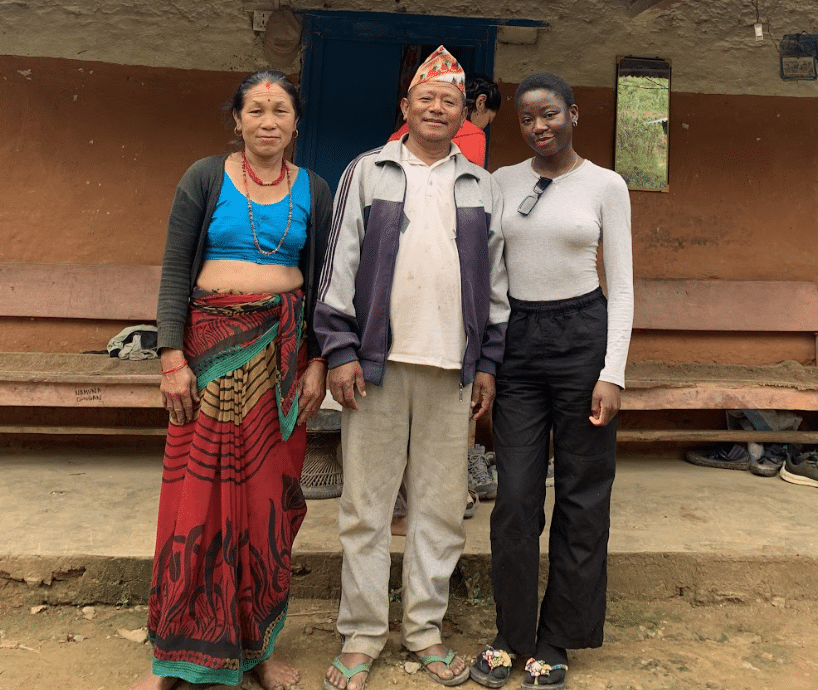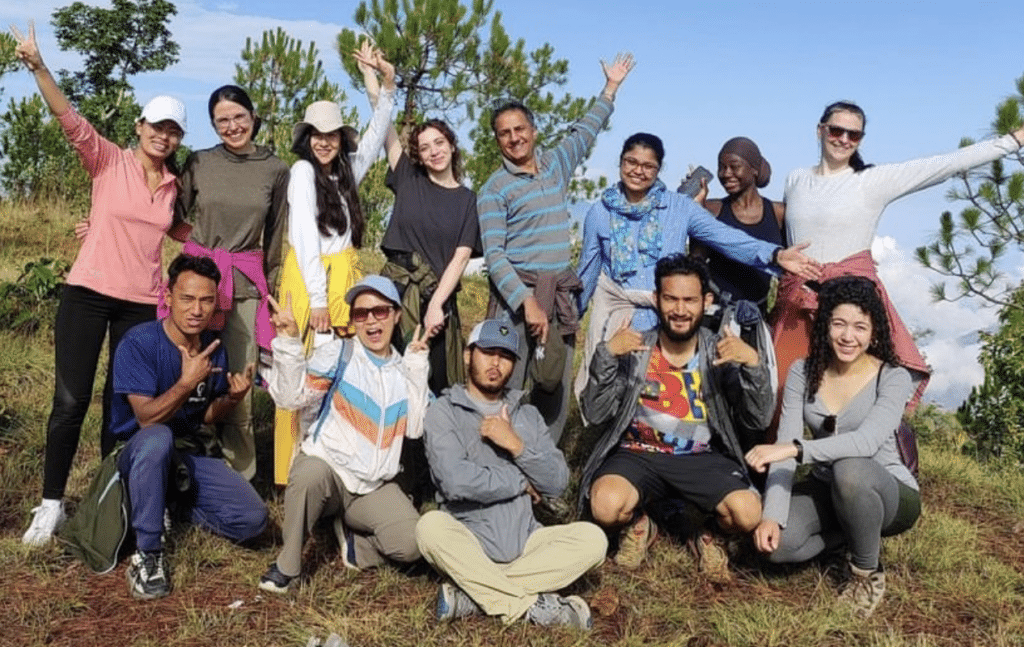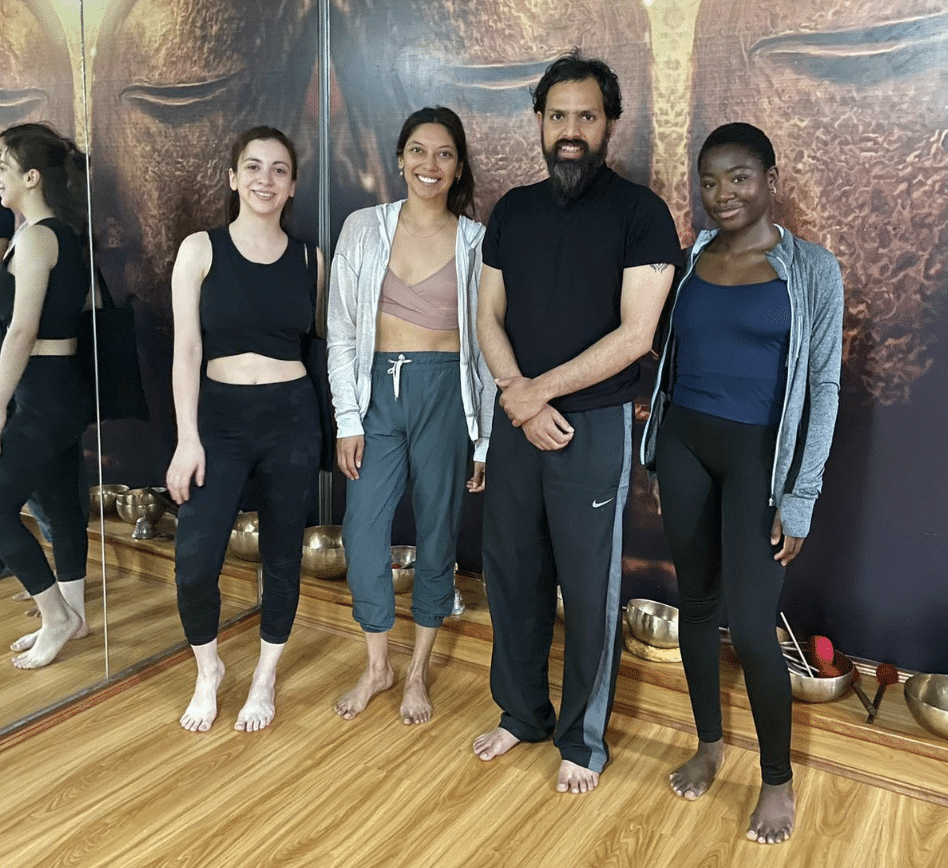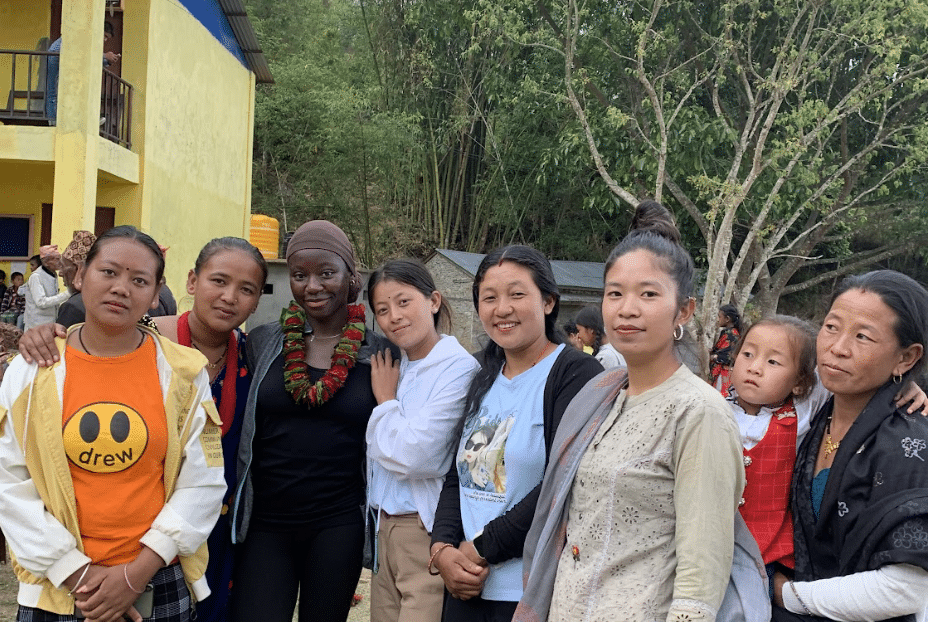
Meet Ashley Taillepierre Tsoka
Nepal 2023
TGP Scholarship Recipient
The University of Sheffield
Masters in Chemical Engineering
Graduation Year: 2021
“The impact of global experiences such as TGP on underrepresented students shouldn’t be underestimated. It allows those who may be or feel confined to their immediate environment, social circle, and resources the chance to benefit from colorful experiences, expand their thinking, and grow their opportunities.”
About Ashley
Previously an engineer by trade, after obtaining a Masters of Engineering in Chemical Engineering, I now work within the technology sector. Choosing to study engineering was an intentional choice for me as I did and continue to respect the impact engineers have on the daily lives of the masses. Working in tech, I see adjacent trends and I’m becoming increasingly aware of the necessity to build on the partnership of the two to solve the challenges facing society today. This was a large part of my interest in The GREEN Program – to continue to seek educational experiences that will allow me to become a leader in addressing societal challenges.
Living in the UK, being born from a Guadeloupean mother and Zimbabwean father, has allowed me to experience and embrace a range of cultures. It’s also given me an understanding of the inherent geographical privileges and disadvantages people face globally. Coming across TGP, I saw it as a unique opportunity to learn through practical experience how renewables, a topic which I’ve long been passionate about, can be implemented sustainably in rural communities in regions of the world I’m less familiar with.
Upon finding out I was a recipient of the TGP Scholarship to study abroad in Nepal I felt relief, as it provided certainty that I’d be able to take the course I’d chosen and been anticipating for the past several months. The scholarship meant for me that the whole experience was affordable and enjoyable in a way that would not have been possible if I had to source the funds by other means.
Preparing for the Adventure: Study Abroad in Nepal
[After accepting my scholarship to study abroad], the enrollment process was quite simple in my opinion. The application process allows you to reflect on why you want to be a part of your selected course and what you want to get out of it. Applying for the scholarship is also very simple and the application allows you the ability to be open about your life experiences. The TGP ambassadors were very responsive, easy to contact when I had questions, and helpful every step of the way.
Before going on the program, I expected a packed schedule due to the extent of the itinerary; to learn through a range of circumstances, and to have coursemates in a narrow age range of current students and recent graduates. Other than this, I went in with no expectations as I wanted to be open to the experience and what it would bring. Upon completion, I can say that it’s hard to anticipate how busy the schedule is until you’re there. In the days before traveling to the village, between lectures, tours, and preparing our capstone projects; barely a second is wasted.
Though not for the faint-hearted I appreciated making the most of all our time spent on the program as well as learning about the culture and discovering the country with locals. Regardless, it would be wise to schedule a few rest days after this trip. The actual range of ages of coursemates was more varied than expected and this honestly only added to the experience and made the group feel complete.
Lastly, as expected, we learned through a range of circumstances and this variety increased the value of the experience. The initial days were taught with lectures from Professor Sagar at the University of Kathmandu as well as other local professionals. We learned about the culture on guided tours as we explored Patan Darbar Square and Kirtipur. In the village of Toksel, we learned the practical elements of installing a solar microgrid from the wiring to fitting the panels. We then got a better understanding of the strategy behind sustainable entrepreneurship and building a sustainable business through group work on our capstone projects.

The Capstone Project: Energy Provisions in the Mille Lacs Band of Ojibwe Tribal Community
The Capstone Project I worked on in my group was titled ‘Energy Keepers: Sustainable Energy Education and Employment Program for Tribal Youth Members’. It addressed the issue of sustainable energy provision in the Mille Lacs Band of Ojibwe tribal community in Central Minnesota and hopes to provide an adaptable model that can be used by other tribal and rural communities.
The need comes from the disparities experienced by Native Americans, including the disproportionate numbers who live in poverty, are unemployed, and even the number of women who are sex trafficked. Energy provision can provide a better quality of life and with community involvement can also increase self-reliance, employment opportunities, and financial independence. Therefore, we included the element of a youth employment program so those within the community can continue to look after it as well as be given the opportunity to learn and develop new technical and specialist skills that will increase their employability.
We came up with the approach as it’s an idea other team members and I want to bring to our respective communities. One of the group members is a part of this specific tribal community so we were able to address a topic that was close to home for her and one where the rest of us were able to learn a lot. As a result, the element of community self-reliance and involvement was important to us, and this presented our main challenge, which was around the funding.
In this instance, with first-hand knowledge from our Ojibwe team member and further research, we were able to gain an understanding of tribal finance and find local enterprises within the same industry that already aim to support the tribe. By considering the different options and combinations in which we’d be able to utilize these resources, we were able to address how we’d initially go about funding the project. The end result was a good understanding of what the students would gain from the program; a complete business canvas model; a plan of how to start the project and an explanation of how we’d ensure the sustainability of the project.
Programs like TGP allow you to bond and build friendships with people who are different from you in terms of where they live, background, and culture but also share your interests and passions.
Networking is something people often struggle with, especially if they’re not fortunate enough to have exposure to people with similar interests or those who are established in their field of interest. Programs like TGP allow you to bond and build friendships with people who are different from you in terms of where they live, background, and culture but also share your interests and passions. This shouldn’t be taken for granted as this time spent with others, means you can learn a lot from them, as well as your surroundings. Being exposed to more insights and triggers will only make you more creative and therefore, a better problem solver. Experiencing other cultures will allow you to relate to a wider group of people and being out of your comfort zone should trigger you to reflect on how you feel and why; to aid your own self-development. It’s also important for underrepresented students to be seen in places that are less familiar to them and for others to embrace, learn from, and about them.

Key Takeaways: The Importance of Sustainable Action During and After Your Study Abroad
On reflection, a large takeaway from the program for me has been the importance of doing. In an era where we have an abundance of information available to us and at ease, it’s easy to get overloaded or consumed with researching endless facts and figures. At the end of the day, those who do are the most likely to achieve and have the biggest impact. This was evident in the fact that we were set a physical task we had to complete and which most of us had no experience carrying out the practical components of. Nonetheless, we got stuck in and realized results we were proud of alongside the students and villagers of Toksel.
When it came to preparing our capstone projects, time was a limited resource. However, each group ended up with a completed project. This really emphasized to me that sometimes your constraints are your strongest drivers and fostering a mindset to recognize where this could be the case may be of benefit.
Additionally, a takeaway I’ve come to realize is you give as much as you take. We provided the students a fundamental resource for improving their standard of living in this instance to hopefully improve their quality of education. We also gained the knowledge and experience of undertaking this kind of project; the experience of being immersed in the village lifestyle in Nepal; the chance to meet great individuals and the ability to inspire our close and wider circles at home through our actions.
As mentioned previously, the educational experience was varied. It was made rich by the unintentional learning moments provided by our environment. Every night in the village, coursemates and facilitators would gather and eat dinner outside the kitchen. After eating on the first night, we were told to clear our plates which most of us naturally did in the bin bag off to the side. When this was noticed, we were told to clear our plates in the bucket instead, as the remaining food would be fed to the animals. This was my favorite learning moment as my village dad was also a farmer and kept two water buffalos and some goats next to our room.
He also showed us the apples, lemons, grapes, and other foods growing around our house. It was refreshing to see the waste-free food cycle from the growth to disposal stage and this be something so innate and embedded (didn’t require a life cycle analysis) in their way of life. Especially, as individuals and companies in the West are increasingly trying to return to a more natural way of living, whether it be through using natural packaging such as banana leaves rather than a plastic bag or growing an allotment of fresh fruit and veg. This emphasizes the importance of looking at differing lifestyles through a fair lens and understanding by which metrics we’d best want to define progress.
Special Moments from the Village
Some of my other favorite learning moments included me and my roommate learning that the animal posing as a barrier between us and the outside toilet, and what we had been referring to as a cow was, in fact, a water buffalo! Our village family was certainly amused by the fact that we couldn’t tell the difference. I loved being introduced to Nepali rap by one of the young boys in the village. Learning of the range of professions the young students are aspiring towards was another amazing moment for me and also hearing the folk songs the villagers sang at our departing bonfire.

The impact of global experiences such as TGP on underrepresented students shouldn’t be underestimated. It allows those who may be or feel confined to their immediate environment, social circle, and resources the chance to benefit from colorful experiences, expand their thinking and grow their opportunities.
In making this scholarship possible I’m especially thankful to Christopher Wang at TGP for informing me of the scholarships and encouraging me to apply and the Ryan Ramsey for making this scholarship possible. Briar Bones at TGP for all her help and liaisons. I’d also like to thank the Royal Academy of Engineering in the United Kingdom for also providing me with additional funding through the Engineering Leaders Scholarship, as well as introducing me to an amazing network of engineers one of whom introduced me to TGP and so I’d also like to thank a cohort friend Khadijah who shared her TGP experience with me in detail!
Ashley’s advice for new GREENies:
Studying abroad is something I’d highly recommend and something I personally wasn’t able to do during [my time at] university due to difficulties in obtaining a passport. This was a process I thankfully started when I was 16 and I received my passport 6 years later. I’d advise [GREENies] to be persistent in obtaining your goal, even if the process seems long and unlikely.
On the topic of funding, whilst you’re a student there is an abundance of scholarships and grants available so search for them as early as you can and make sure to apply with a strong application. The earlier you apply the more chances you have to reapply in the following years if not initially successful. Build and seek a network of like-minded individuals through the events and societies available to you as this is another way you’ll hear about programs of interest like TGP and how people similar to you have been able to access them.
Lastly, don’t be shy to reach out to people whose experiences you aspire to. Show your genuine interest and you’ll likely be met with a wave of inspiration and a better understanding of your next steps.
